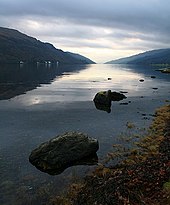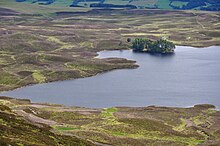Loch

Loch (
Lochs which connect to the sea may be called "sea lochs" or "sea loughs". Some such bodies of water could also be called firths, fjords, estuaries, straits or bays.
Background




This name for a body of water is Insular Celtic[2] in origin and is applied to most lakes in Scotland and to many sea inlets in the west and north of
Lowland Scots orthography, like Scottish Gaelic, Welsh and Irish, represents /x/ with ch, so the word was borrowed with identical spelling.
English borrowed the word separately from a number of loughs in the previous Cumbric language areas of Northumbria and Cumbria. Earlier forms of English included the sound /x/ as gh (compare Scots bricht with English bright). However, by the time Scotland and England joined under a single parliament, English had lost the /x/ sound. This form was therefore used when the English settled Ireland. The Scots convention of using ch remained, hence the modern Scottish English loch.
In Welsh, what corresponds to lo is lu in Old Welsh and llw in Middle Welsh (such as in today's Welsh placenames Llanllwchaiarn, Llwchwr, Llyn Cwm Llwch, Amlwch, Maesllwch), the Goidelic lo being taken into Scottish Gaelic by the gradual replacement of much Brittonic orthography with Goidelic orthography in Scotland.
Many of the loughs in Northern England have also previously been called "meres" (a Northern English-dialect word for "lake", and an archaic Standard English word meaning "a lake that is broad in relation to its depth"), similar to the Dutch meer, such as the Black Lough in Northumberland.[3] However, reference to the latter as loughs (lower case initial), rather than as lakes, inlets and so on, is unusual.
Some lochs in Southern Scotland have a Brythonic, rather than Goidelic, etymology, such as Loch Ryan, where the Gaelic loch has replaced a Cumbric equivalent of Welsh llwch.[4] The same is, perhaps, the case for bodies of water in Northern England named with 'Low' or 'Lough', or else represents a borrowing of the Brythonic word into the Northumbrian dialect of Old English.[4]
Although there is no strict size definition, a smaller loch is often known as a lochan (spelled the same also in Scottish Gaelic; in Irish, it is spelled lochán).
Perhaps the most famous Scottish loch is Loch Ness, although there are other famous ones, such as Loch Awe, Loch Lomond and Loch Tay.
Examples of sea lochs in Scotland include Loch Long, Loch Fyne, Loch Linnhe, and Loch Eriboll. Elsewhere in Britain, places like the Afon Dyfi can be considered sea lochs.
Uses of lochs
Some new
Scottish lakes
Scotland has very few bodies of water called lakes. The
The word "loch" is sometimes used as a shibboleth to identify natives of England, because the fricative [x] sound is used in Scotland whereas most English people mispronounce the word as "lock".[6]
Lochs outside Scotland and Ireland
As "loch" is a common Gaelic word, it is found as the root of several Manx place names.
The United States naval port of Pearl Harbor, on the south coast of the main Hawaiian island of Oʻahu, is one of a complex of sea inlets. Several are named as lochs, including South East Loch, Merry Loch, East Loch, Middle Loch and West Loch.
Loch Raven Reservoir is a reservoir in Baltimore County, Maryland.
Brenton Loch in the Falkland Islands is a sea loch, near Lafonia, East Falkland.
In the Scottish settlement of
Loch Fyne is a fjord in Greenland named by Douglas Clavering in 1823.
See also
References
- doi:10.1093/OED/8929108233. (Subscription or participating institution membershiprequired.)
- Irish English and Standard English.
- ISBN 978-0-946928-41-5.
- ^ a b Alan, James. "Brittonic Language In The Old North - A Guide To Place Name Elements" (PDF). Archived from the original (PDF) on 13 August 2017. Retrieved 29 July 2018.
- ^ "Lake of Menteith | Scotland's Only Lake | Trossachs.co.uk".
- ^ "LOCH | Pronunciation in English". dictionary.cambridge.org. Retrieved 2 December 2020.
- ^ "Lochgarrylakeassociation - LGLA Action". Archived from the original on 20 October 2013. Retrieved 15 June 2012.
